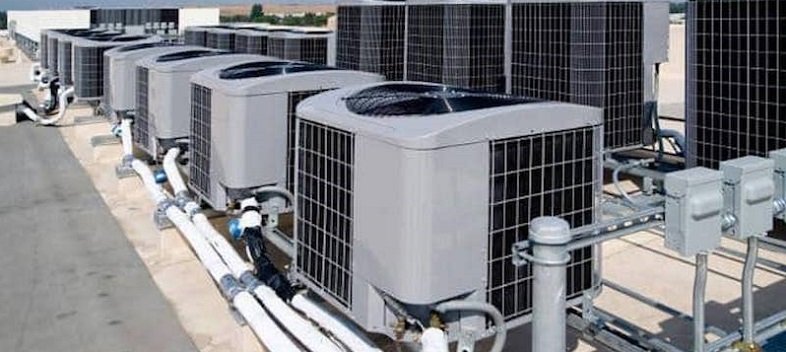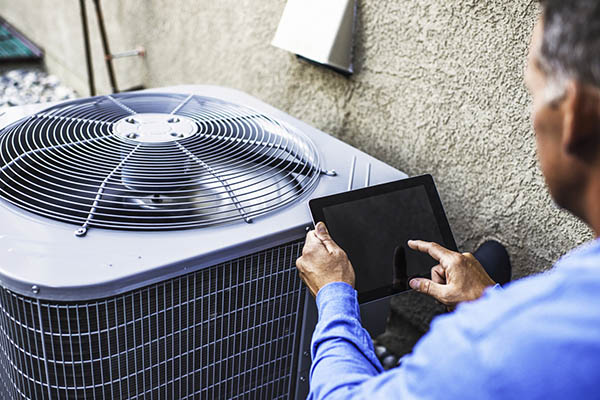Picking Between a Heatpump and Furnace: Key Considerations for Your Heating And Cooling Needs
When examining home heating alternatives for heating and cooling requires, the choice between a heatpump and a heater can be complicated. Each system uses unique benefits customized to details climates and power effectiveness goals. Understanding these differences is important for making an informed option. Key factors such as installation expenses and ecological influence even more make complex the option procedure. Which option absolutely lines up with one's comfort and sustainability preferences? The adhering to areas will explore these considerations in detail.
Comprehending Warmth Pumps: Exactly How They Function and Their Advantages
While lots of house owners think about various heating alternatives, recognizing exactly how heat pumps function and their advantages can greatly affect their choice. Warmth pumps run by transferring warmth instead of creating it. In the winter months, they extract heat from the outside air or ground and move it inside your home, while in the summertime, they reverse this process, cooling down the home by removing heat outside. This double capability makes them flexible for year-round climate control.One of the main benefits of warmth pumps is their power performance. They make use of significantly much less power compared to standard heating unit, potentially leading to lower energy expenses (heat pump installation ooltewah tn). In addition, heat pumps have a smaller sized carbon footprint, making them an eco friendly option. They additionally need much less maintenance than traditional systems, adding to lasting expense financial savings. On the whole, understanding the technicians and benefits of heatpump can aid home owners make notified decisions concerning their heating and cooling down demands
Exploring Heating Systems: Types, Procedure, and Benefits
Heating systems come in different kinds, consisting of gas, electrical, and oil models, each with unique functional mechanisms. Understanding these distinctions is essential, as they affect efficiency and heating efficiency. Additionally, heating systems use countless benefits, such as constant warm output and dependability in cooler climates.
Sorts of Furnaces
Heater can vary significantly in design and operation, with heaters being a prominent selection amongst house owners. There are a number of kinds of heaters, each using various fuel resources and technologies. Gas heaters prevail, leveraging all-natural gas to create warmth effectively. Electric heating systems, on the other hand, utilize electric resistance to generate heat, often favored for their simple installment. Oil heaters, while much less common, work in areas with limited gas accessibility (heat pump service). Furthermore, condensing heating systems make the most of power performance by reusing and capturing exhaust gases. Each kind runs through a system of warmth exchangers and ductwork to distribute cozy air throughout a home. Comprehending the distinctions between these furnace types is vital for informed cooling and heating decisions
Benefits of Heaters
For homeowners looking for reputable warmth during cold months, the advantages of heaters are significant. Heaters supply regular heating, making sure even temperatures throughout the home. They are specifically effective in extreme cold, frequently outmatching heatpump in freezing problems. Various kinds, including gas, electrical, and oil heating systems, offer versatility to meet varied requirements and preferences.Furnaces likewise have a tendency to have lower first installment expenses contrasted to heatpump, making them a more accessible choice for lots of. Their robust style adds to a longer lifespan, with several systems lasting over 15 years with appropriate upkeep. In addition, contemporary heaters are frequently equipped with advanced innovation for enhanced performance, which can bring about lowered power expenses. On the whole, heating systems stay a trustworthy selection for reliable home heating.

Energy Performance: Contrasting Warmth Pumps and Furnaces
When contrasting power efficiency in between warmth pumps and heaters, the Seasonal Energy Effectiveness Ratio (SEER) plays a crucial duty in identifying performance. Additionally, a functional cost analysis reveals the long-term financial implications of each system. Understanding these variables can lead house owners in making notified choices about their heating options.
Seasonal Energy Efficiency Proportion
Energy effectiveness plays a vital role in the decision-making process in between heatpump and furnaces, especially when taking into consideration the Seasonal Energy Performance Ratio (SEER) This statistics measures the cooling effectiveness of warm pumps over a whole cooling period, supplying a standard method to examine performance. Greater SEER rankings suggest higher power efficiency, equating to reduced power usage and decreased utility bills. On the other hand, heating systems are typically assessed making use of the Annual Fuel Usage Effectiveness (AFUE) rating, which shows heating effectiveness. When comparing these 2 systems, house owners ought to focus on SEER rankings for heatpump, as they straight impact general energy cost savings and ecological sustainability. An extensive understanding of SEER can notably affect the lasting fulfillment and cost-effectiveness of the picked a/c service.
Operational Price Evaluation
Understanding the functional expenses related to heatpump and furnaces is essential for homeowners assessing their choices. Heatpump commonly offer greater power performance, transforming electrical power right into heat with minimal waste. This leads to reduced monthly utility bills, specifically in modest environments. On the other hand, standard heaters, specifically gas models, may have reduced upfront expenses yet can incur higher operational expenditures over time as a result of sustain prices and performance ratings.Moreover, heatpump can operate as both heating and cooling down systems, possibly minimizing the need for different HVAC units. While preliminary financial investments for heat pumps might be greater, their long-term cost savings in energy performance can make them an extra cost-efficient choice for numerous houses. Careful analysis of local power prices is important to identify the very best choice.
Setup Prices: What to Expect for every Heating Unit
Installation expenses for heater can differ substantially between warmth pumps and heating systems, influencing homeowners' choices. Heat pumps usually have higher ahead browse around this web-site of time setup expenses, normally varying from $3,500 to $8,000, depending upon the device dimension and complexity of setup. This includes the exterior system, indoor handling system, and necessary ductwork alterations. On the other hand, furnaces tend to have reduced preliminary prices, averaging between $2,500 and $6,000, which can be appealing for budget-conscious home owners. However, setup costs can increase if comprehensive ductwork is required.Moreover, the option of gas kind for furnaces-- gas, gas, or electric-- can additionally influence setup prices. While warmth pumps use power efficiency, their first financial investment might prevent some buyers. Eventually, reviewing installation prices along with long-term financial savings and efficiency will certainly assist house owners in making informed choices about their home heating systems.
Environment Factors To Consider: Which System Carries Out Better in Your Area
Exactly how do environment problems influence the effectiveness of home heating systems? The efficiency of warm pumps and furnaces can vary significantly depending on the neighborhood environment. In modest environments, heatpump excel by efficiently moving warmth from the outdoors air, making them an energy-saving choice. Their performance reduces in exceptionally cold temperature levels, where they may struggle to extract enough warm. Conversely, heating systems, especially gas designs, give constant and trustworthy warm no matter outside conditions, making them more effective in chillier regions.In locations that experience milder winter seasons, heatpump can operate effectively year-round, supplying both home heating and cooling. In comparison, areas with severe wintertimes frequently take advantage of the robustness of heating systems. Ultimately, understanding the regional environment is crucial when determining in between a heat pump and a heating system, as it straight affects their functional performance and total performance.
Maintenance Needs: Long-Term Look After Warm Pumps vs. Furnaces
While both heatpump and heating systems need routine upkeep to guarantee peak efficiency, their certain requirements and treatment routines vary considerably. Furnaces normally require much less constant focus, with yearly assessments being sufficient to look for gas leakages, tidy filters, and assess overall functionality. Their easier style frequently allows for uncomplicated repairs.In contrast, heatpump necessitate semiannual upkeep because of their dual role in home heating and air conditioning. This includes cleaning coils, inspecting refrigerant levels, and ensuring that both the exterior and indoor units work at their ideal. Additionally, heatpump upkeep usually involves more detailed components, making professional maintenance essential.Neglecting upkeep can lead to lessened efficiency and raised power costs for both systems. Eventually, house owners need to consider these long-lasting treatment needs when picking in between a warmth pump and a heating system, as proactive upkeep can prolong the life expectancy and performance of either system considerably.
Ecological Influence: Choosing a Sustainable Home Heating Alternative
The environmental impact of heater is a crucial analysis for homeowners looking for lasting options. Heatpump are generally more energy-efficient than standard furnaces, as they move warm rather than create it, substantially minimizing carbon exhausts. By using renewable resource sources, such as air-source or geothermal heatpump, property owners can even more reduce their eco-friendly footprint.On the other hand, all-natural gas heating systems discharge greenhouse gases and add to air contamination, though they often provide higher heat result. Nevertheless, advancements in innovation have actually led to the development of high-efficiency heaters that lessen emissions.Ultimately, choosing a furnace entails considering efficiency versus environmental effect. Property owners are encouraged to review local power resources and incentives for eco-friendly systems, ensuring a selection that straightens with both personal comfort and ecological obligation. The choice affects not only prompt comfort but likewise lasting sustainability and ecological health and wellness.
Frequently Asked Inquiries
The Length Of Time Do Heat Pumps and Furnaces Generally Last?
The life-span of warm pumps generally varies from 15 to 20 years, while heaters can last between 15 to thirty years. Normal upkeep substantially impacts their long life and effectiveness in giving home heating services.
Can I Make Use Of a Warm Pump in Very Cold Climates?
Warm pumps can operate in incredibly chilly environments, yet their efficiency lessens as temperatures decrease. In such problems, supplemental heating resources might be essential to maintain comfortable indoor temperature levels and assure peak performance.

What Is the Sound Degree of Warm Pumps Versus Furnaces?
The noise levels of warm pumps and furnaces differ significantly. Typically, warm pumps run even more quietly than typical heating systems, making them more effective for those sensitive to appear, while heating systems might produce louder functional sounds during home heating cycles.
Are Warmth Pumps Suitable for Both Heating and Air conditioning?
Heatpump official site are certainly suitable for both heating & cooling (heat pump replacement ooltewah tn). They function by transferring warm, providing effective temperature level control year-round, making them a versatile selection for homeowners looking for an all-in-one a/c option
What Dimension Heater Do I Need for My Home?
Figuring out the ideal dimension furnace for a home needs assessing aspects such as square footage, insulation high quality, neighborhood climate, and the home's design. Consulting a professional can guarantee an exact assessment and perfect convenience. Warm pumps usually provide higher power performance, transforming electric energy right into warmth with very little waste. In moderate climates, heat pumps stand out by efficiently transferring heat from the outside air, making them an energy-saving alternative. On the other hand, heaters, particularly gas versions, provide reputable and constant warmth no matter of outdoor problems, making them better in colder regions.In locations that experience milder wintertimes, warmth pumps can run successfully year-round, giving both home heating and air conditioning. Warmth pumps are usually more energy-efficient blog than conventional furnaces, as they move warm rather than generate it, considerably decreasing carbon emissions. By utilizing renewable power sources, such as air-source or geothermal warmth pumps, property owners can further minimize their eco-friendly footprint.On the various other hand, all-natural gas furnaces send out greenhouse gases and add to air contamination, though they frequently supply higher warm output.